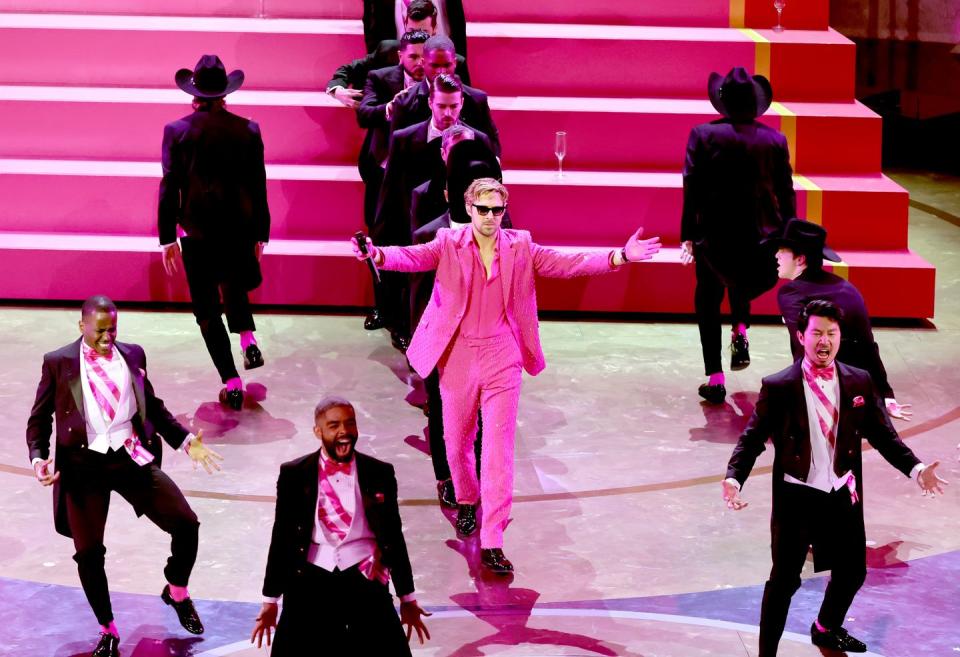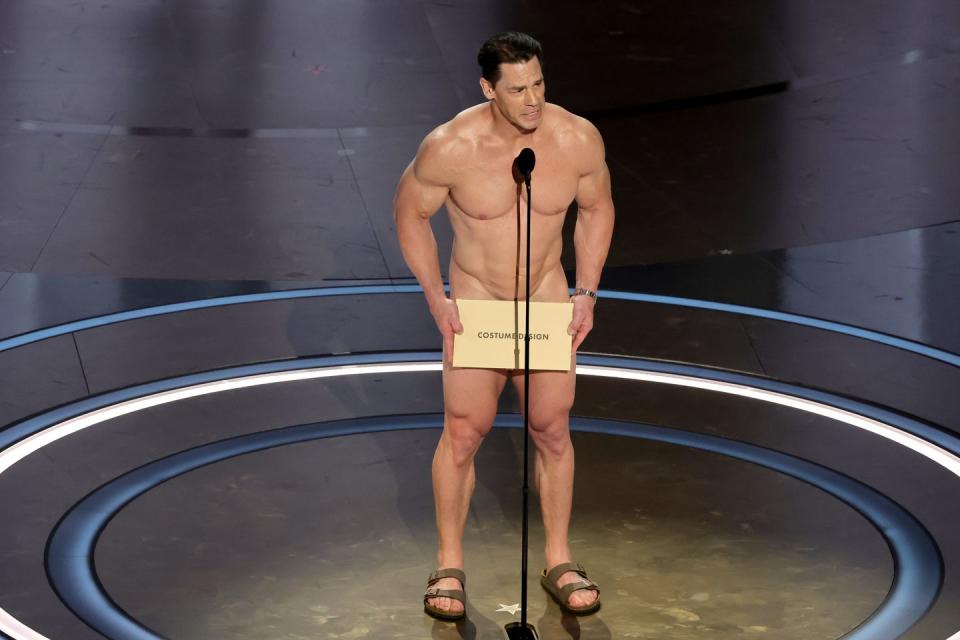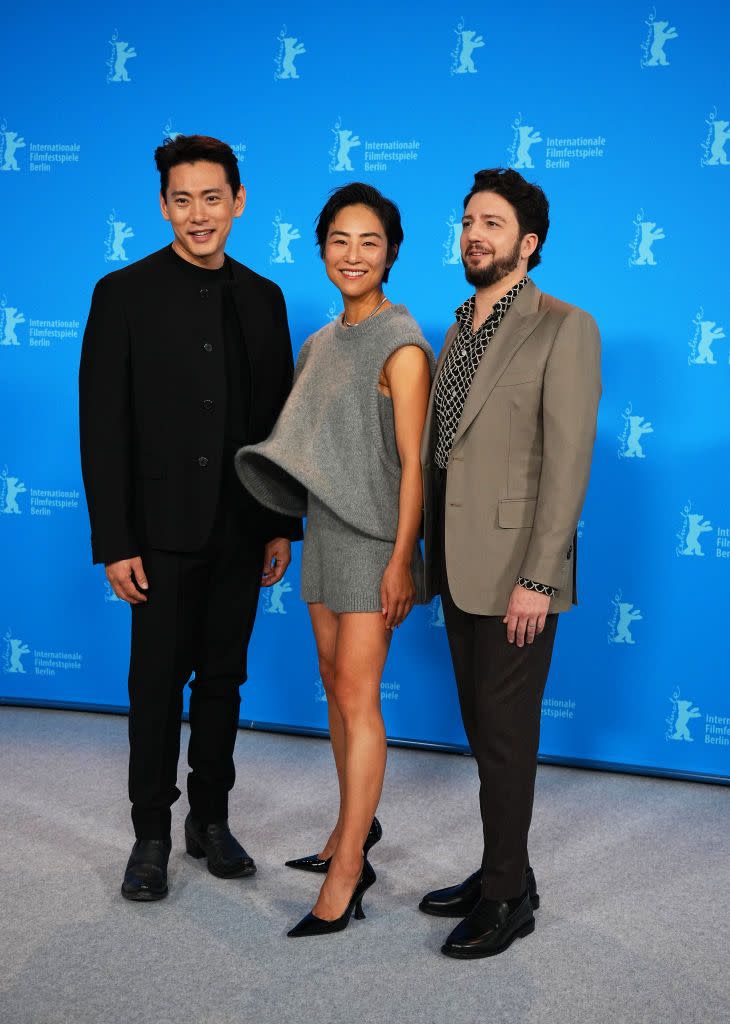How Are Men Doing Right Now? The Academy Awards Offered a Grim Answer.
- Oops!Something went wrong.Please try again later.
- Oops!Something went wrong.Please try again later.

"Hearst Magazines and Yahoo may earn commission or revenue on some items through these links."
If they gave awards for the best performance during the Oscars telecast, this year’s trophy would go to Ryan Gosling, whose rendition of “I’m Just Ken” seemed to delight everyone watching. The New York Times called it one of the night’s “most exuberant” moments. The biggest actual winner at this year’s Academy Awards was Christopher Nolan’s soaring biopic about the man who invented the atomic bomb, Oppenheimer, which took home seven statuettes, including Best Picture, Best Director, Best Actor, and Best Supporting Actor. You might look at this and say it was a good night for men, which is ironic, because nearly all the films nominated for Best Picture—including Oppenheimer—tell a different story about men, and it’s not good.
Every year, the Oscars provide a unique opportunity to look at the past twelve months in cinema and divine what it all meant. If you’re willing to squint, it’s possible to see that the films we choose to honor tell us about ourselves—where we’ve been, where we’re headed, and, most importantly, where we are right now. Like most great art, movies are big-screen reflections of their moment in time, a conversation with the zeitgeist. Whether it was Hollywood cranking out escapist comedies to lift the country’s mood during the Great Depression or a new, more political generation of maverick filmmakers tapping into the anti-war movement and the counterculture with films about antiheroes with downbeat endings in the late ‘60s, movies are a barometer of what’s going on in our culture at large. Or, as Jean-Luc Godard famously said, they’re “truth 24 frames per second.”
So what did this year’s slate of Best Picture movies tell us about ourselves?

There was Leonardo DiCaprio’s wife-poisoning war veteran Ernest Burkhart in Killers of the Flower Moon, Willem Dafoe’s God-playing Victorian quack Dr. Godwin Baxter in Poor Things, Jeffrey Wright’s literary charlatan Monk Ellison in American Fiction, and Paul Giamatti’s curmudgeonly classics teacher Paul Hunham in The Holdovers. Our gender’s on-screen surrogates were a collection of murderers, mad scientists, cheats, and cranks. Even Bradley Cooper’s appreciative biopic of Leonard Bernstein couldn’t avoid painting the conductor as a difficult narcissist, albeit an insanely talented one. As for The Zone of Interest’s banally evil concentration camp commandant, well, I’m not even touching that one. Either way, the underlying message from these pictures was a clear and resounding one: something is wrong with men.
Without question, the biggest box-office story of 2023 was the one-two blockbuster punch known as “Barbenheimer.” While a three-hour psychological meditation on the creation of the atomic bomb and a bubblegum-colored satire about a living doll couldn’t seem more different on paper, if you look closely, there are certain thematic parallels between the two. Both the A-bomb and Mattel’s iconic doll were mid-century American inventions that were each dangerous in their own ways: the bomb to basically every living soul on the planet; the doll to generations of young girls who were led to believe that the single-minded pursuit of stylish new ensembles and Malibu dream houses were what mattered most.

As brilliant as Nolan’s epic was, there’s really no getting around the fact that as complexly as newly minted Oscar winner Cillian Murphy portrayed J. Robert Oppenheimer, the man was largely responsible for the ticking doomsday clock that has haunted us for the past 80 years. And while Barbie was initially the brainchild of a woman, Ruth Handler, it was the boardroom of male-dominated Mattel execs that ensured that she would become a plastic cipher with impossible, gravity-defying physical proportions. She’s devoid of a real personality or inner life and the box she’s packaged in is a cardboard prison. Meanwhile, Ryan Gosling’s charmingly dim, platinum-blonde himbo Ken evolves—or rather devolves—over the film’s 114 giddy minutes from a sunny sidekick who’s just happy to be along for the ride to a toxic avenger of the patriarchy. He’s a Day-Glo villain in a sleeveless denim vest.
How do all these on-screen worlds mirror the one in which we currently live? American men are in crisis. Our life expectancy has dropped, due partly to Covid deaths, but also from increases in drug overdoses, suicides, and homicides. Nearly every mass shooting event in America is carried out by a man. Far fewer men are going to college compared with women. In American universities, there are nearly two female undergraduates for every male. A number of men are dropping out of the workforce during their prime years. Men seemed to be pissed off at everything, and largely adrift. With few positive male role-models, self-help charlatans like Jordan Peterson, who offer retrograde views of masculinity, have gained popularity. And then there’s Donald Trump, whose hollow, grievance politics has proved appealing to American men. A movie like Barbie gets this. If you peek beneath the movie’s shiny happy surface, it offers men a roadmap for how their lives might take shape in a matriarchy. Many men in the audience may not like this, but at least it’s there. And by the end, Ken, for one, appears to be content with it.
Perhaps the only real exception to this year’s otherwise hissable gallery of on-screen male rogues came from writer-director Celine Song’s intimate romantic drama Past Lives. Unspooling over the course of two decades, this wistful love story tracks the relationship between Nora (Greta Lee) and Hae Sung (Teo Yoo) from their days as twelve-year-old schoolmates in Seoul into the complex minefield of their thirties. Yoo’s performance is a revelation of kindness and yearning. Twelve years after they part ways the first time, he searches for Nora on Facebook. And his commitment to finding her was swoon-worthy to the women in the audience because it’s an expression of emotion they so rarely get to see from guys in real life. Fast-forward another twelve years, and Nora is married to Arthur (John Magaro). You can see why Nora’s so drawn to him because we’re drawn to him, too. Realizing that he may be standing in the way of Hae Sung and Nora’s destined reunion, he doesn’t explode in a toxic fit of male rage of jealousy, instead he reassures Hae Sung that he’s glad to have gotten the chance to meet him.

If there’s a takeaway from this—other than the fact that the director of Past Lives obviously didn’t see many of her fellow nominees’ films—it’s that there is hope for us men. We can choose not to sell our souls and write disingenuous novels; we can choose not to be grouchy academics; we can choose not to invent weapons of mass destruction that will send us all to oblivion. We don’t have to be stooges of the patriarchy like Ken briefly is. And during the 96th Academy Awards, we saw that these lessons were already beginning to sink in. Gosling stole the evening by bringing a massive dose of hot-pink Kenergy to his showstopping musical number after gamely being dressed down from co-presenter Emily Blunt for “Ken-splaining” to her. John Cena dropped the macho act to get vulnerable and tip-toe onto the stage completely nude save for a strategically placed envelope. Robert Downey Jr. gave an acceptance speech that thanked his wife for turning his life around (“She found me a snarling rescue pet, and loved me back to life.”). And Nolan ceded the spotlight for the greatest honor of his filmmaking career to his producer and off-screen partner, Emma Thomas, standing behind her, proudly looking on as she delivered their Best Picture acceptance speech.
Maybe these are just baby steps in the right direction, but they’re steps nonetheless. Because last night, when the final statuette was handed out at the Dolby Theatre, it didn’t feel like men were the evening’s big winners, but instead that something ineffable had begun to change after a pretty rough year in cinema for the fellas. There was a faint glimmer of hope that if we are willing to be naked and afraid, if we’re willing to forget our egos and take a step back rather than a lunge forward, maybe we won’t have to see ourselves painted as a bunch of losers on screen next year.
Keep Reading:
You Might Also Like

